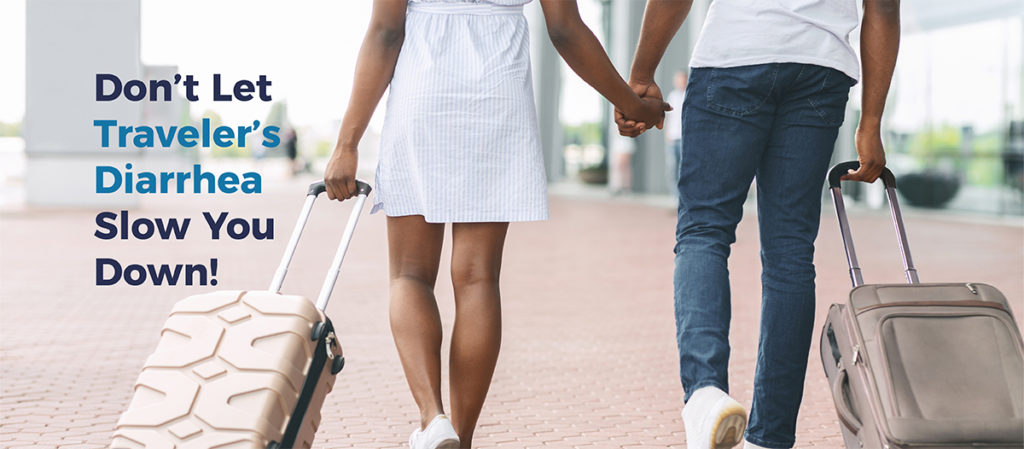Now that it is getting close to summer, folks are starting to consider vacation travel plans. This newsletter will discuss options for staying healthy when traveling outside the United States to developing countries.
I would like to review the updated recommendations in preventing and treating Traveler’s diarrhea (TD).
Overview: Among travel-related illnesses, acute diarrhea is the most common disorder. A study of Americans visiting developing countries found that 46% acquired diarrhea (1). Destination is the most significant risk factor for developing diarrhea. Areas with highest risk are developing countries in Latin America, the Middle East, Africa and South Asia.
Definition: Traveler’s diarrhea is defined as three or more unformed stools per 24 hours starting during or shortly after a period of foreign travel with at least one of the following symptoms: fever, nausea, vomiting, or abdominal cramps. Most episodes last 3-4 days without therapy, but some infections can cause severe diarrhea and dehydration requiring hospitalization and IV fluids.
Etiology: The cause of TD is exposure to food and water that has been contaminated with fecal matter due to poor sanitary and public health conditions.
The organisms that cause the diarrhea are bacteria, viruses and parasites. Studies have found that bacteria like E. Coli, Shigella and Campylobacteria account for 80% of the episodes (2). Parasites and viruses are less common causes although there have been a number of outbreaks on cruise ships due to viruses (3).
Prevention: Travelers are advised to ”boil it, cook it, peel it, or forget it.” Unfortunately, despite pre-travel advice, many travelers still develop diarrhea even when avoiding high risk foods. The general recommendations include avoid raw vegetables, fruits that you have not peeled, unpasteurized dairy products, cooked food not served steaming and tap water, including ice. Although it smells and looks great…don’t eat food from street vendors!
Drug prophylaxis: There have been a number of studies evaluating different medications taken on a daily basis in order to prevent the development of diarrhea.
Antibiotics: It is not generally recommended to prescribe antibiotics as a prophylaxis to prevent TD as it can lead to drug resistant organisms (4). In immuno-compromised individuals or those with serious health issues, use of prophylactic antibiotics may be beneficial. Taking daily antibiotics like ciprofloxin (Cipro) 500mg, or levofloxacin (Levaquin) 500mg have been used successfully to prevent bacterial diarrhea in 90% of those treated (5).
Rifaximin (Xifaxan) is a non-absorbable antibiotic that has also been shown to lessen the risk of TD in 75% of those taking a single 200mg dose daily. However, the antibiotic does not protect against invasive bacteria like Samonella.
Bismuth subsalicylate: Pepto-Bismo provides a protection rate of 60% when given as two tablets 4 times daily (6). It does cause the tongue and stool to turn black and can cause ringing in the ears. It is not recommended to use this regimen for more than 3 weeks.
Probiotics: A statistical analysis of 12 control trials found that 85% of TD cases were prevented by probiotics (6). The dosage of probiotic bacteria given and the type of organisms varied. It is difficult to generalize that all probiotics are effective. The analysis did find that probiotics containing lactobacillus and Bifidobacteria strains were effective. Also, probiotics containing a yeast, Saccharomyces boulardii, lessened the risk of TD (6).
Probiotics are a more natural approach to prophylaxis. The bacteria colonize the intestines and prevent the pathogenic bacteria from successfully producing harmful toxins and invading the mucosa.
Treatment
Generally, traveler’s diarrhea is a self-limited illness without fever lasting several days. Unfortunately, it is not possible to determine after the first loose stool the length and severity of the illness. Having diarrhea while on vacation or on a business trip can be very disruptive to planned activities. There are several recommendations:
- Start an antibiotics if the there are 3 or more loose stools in an eight hour period. The drug of choice is still Cipro 500 mg twice daily for 3 days. If there is no fever or blood in the stools, an alternative antibiotic is Rifaximin 200 mg three times daily for 3 days.
- There are areas (e.g., Thailand) where the bacteria are resistant to Cipro type medication; in these areas, Azithromycin (Zithromax) is recommended 500mg once daily for 3 days.
- To lessen the diarrhea and cramps, Pepto Bismo 1 oz (2 tbsp) every half hour for a total of 8 doses (16 tbsps) in eight hours. Pepto Bismo eases the cramps, nausea and diarrhea without any serious side effects.
- Another medication used to lessen diarrhea and cramps is loperamide or Imodium. Take a loading dose (4 mg) after the first loose stool and then 2mg after every loose stool for a total of 8 doses (16 mg) in 24 hours. This will ease the symptoms of diarrhea and help prevent dehydration. A warning though: do not take Imodium if there is fever or blood in the stool. Imodium slows the motility of the colon and can possibly make an invasive infection worse.
- Rehydration packets like CeraLyte electrolyte packets can be added to water to help maintain hydration. Otherwise, replace fluids with plenty of water and replace lost electrolytes using foods like broth and saltine crackers.
Final Recommendation
- If traveling to a developing country, access the CDC webpage for information on immunizations and other health questions. http://wwwn.cdc.gov/travel/
- Contact your physician regarding prescriptions for the antibiotics to take if you develop TD. It is important to start therapy on a timely basis. Trying to obtain medical care and medicines while traveling delays treatment and medications purchased abroad may be substandard.
- Take a good probiotic like EndoMune on a daily basis. Start 2-3 days before you travel. In general, good probiotics should be refrigerated. Studies have shown that EndoMune will survive at room temperature for months. It is best not to store probiotics in temperatures greater than 85 degrees for prolonged periods.
Finally, I hope all your travels are joyful, safe, and healthy. Don’t forget to pack your camera…and some EndoMune.
Eat healthy, exercise and live well!!
Dr. Hoberman
(1) Hill DR: Occurrence and self-treatment of diarrhea in a large cohort of Americans traveling to developing countries. Am J Trop Med Hyg 2000;62:585-9.
(2) Steffen R, Sack RB:Epidemiology. In: Ericsson CD, DuPont HL, Steffen R, eds. Travelers’ diarrhea; Hamilton, Ont.: BC Decker, 2003: 112-23
(3) Chapin AR, Carpenter CM, Dudley WC, et al: Prevalence of norovirus among visitors from the United States to Mexico and Guatemala who experienced traveler’s diarrhea. J Clin Microbiol 2005;43:1112-1117.
(4) Centers for Disease Control: http://wwwn.cdc.gov/travel/
(5) Rendi-Wagner P, Kollaritsch H. Drug prohylaxis for traveler’s diarrhea. Clin Inft. Dis 2002;34:628-33.
(6) Steffen R, Heusser R, DuPont HL: Prevention of travelers’ diarrhea by nonantibiotic drugs. Rev Infect Dis; 1986;8(suppl 2);S151-9.
(7) McFarland LV: Meta-analysis of probiotics for the prevention of traveler’s diarrhea. Travel Med Infect Dis. 2007;2:97-105.



